I'm curious, if there's any way to find out the UTC date/time when the next Daylight Saving adjustment will take place?
Something akin to what Windows reports (see circled):

I'm curious, if there's any way to find out the UTC date/time when the next Daylight Saving adjustment will take place?
Something akin to what Windows reports (see circled):

This information is provided in Windows by the EnumDynamicTimeZoneInformation function.
See http://msdn.microsoft.com/en-us/library/windows/desktop/hh706893%28v=vs.85%29.aspx
There is a database that has code and data: http://www.iana.org/time-zones
I don't think there's a specific API for this. I would just do a binary search, using localtime (and maybe time and mktime) from <ctime> (C++) or <time.h> (C).
A basic approach is to scan ahead three months at a time until the tm_isdst flag in the returned data structure is flipped. Then you can start binary searching between the last two two dates to figure out exactly when it flips.
See http://www.cplusplus.com/reference/ctime/tm/ for reference material.
I appreciate all your replies. And, yes, indeed I was asking about a WinAPI for Windows.
I did more research and came up with the following method that does what I wanted. It uses C++ and MFC's COleDateTime for easier date/time calculations. Other than that it's just C++ and WinAPIs. Please check if I understood the documentation for the DYNAMIC_TIME_ZONE_INFORMATION correctly. Here's the code:
int GetNextDaylightSavingAdjustmentTime(SYSTEMTIME* pOutDtNextDST_Local, int* pnOutAdjustmentMin)
{
//Get next time when DST adjustment will take place
//'pOutDtNextDST_Local' = if not NULL, receives the (local) time when next DST adjustment will take place
//'pnOutAdjustmentMin' = if not NULL, receives the amount of adjustment in minutes
//RETURN:
// = 1 if got the time, or
// = 0 if DST is not used
// = -1 if error (check GetLastError() for info)
int nOSError = NO_ERROR;
//Load API dynamically (in case of Windows XP)
BOOL (WINAPI *pfnGetDynamicTimeZoneInformation)(PDYNAMIC_TIME_ZONE_INFORMATION);
(FARPROC&)pfnGetDynamicTimeZoneInformation =
::GetProcAddress(::GetModuleHandle(L"Kernel32.dll"), "GetDynamicTimeZoneInformation");
DWORD tzID;
SYSTEMTIME StandardDate;
SYSTEMTIME DaylightDate;
int nBiasDaylight;
//Use newer API if possible
if(pfnGetDynamicTimeZoneInformation)
{
DYNAMIC_TIME_ZONE_INFORMATION dtzi = {0};
tzID = pfnGetDynamicTimeZoneInformation(&dtzi);
StandardDate = dtzi.StandardDate;
DaylightDate = dtzi.DaylightDate;
nBiasDaylight = dtzi.DaylightBias;
}
else
{
//Older API
TIME_ZONE_INFORMATION tzi = {0};
tzID = GetTimeZoneInformation(&tzi);
StandardDate = tzi.StandardDate;
DaylightDate = tzi.DaylightDate;
nBiasDaylight = tzi.DaylightBias;
}
int nRes = -1;
int nAdjMins = 0;
SYSTEMTIME stDstChange;
memset(&stDstChange, 0, sizeof(stDstChange));
SYSTEMTIME stDst;
if(tzID == TIME_ZONE_ID_STANDARD ||
tzID == TIME_ZONE_ID_DAYLIGHT)
{
stDst = tzID != TIME_ZONE_ID_DAYLIGHT ? DaylightDate : StandardDate;
if(stDst.wMonth >= 1 &&
stDst.wMonth <= 12 &&
stDst.wDay >= 1 &&
stDst.wDayOfWeek >= 0 &&
stDst.wDayOfWeek <= 6)
{
//Get adjustment bias
nAdjMins = tzID != TIME_ZONE_ID_DAYLIGHT ? -nBiasDaylight : nBiasDaylight;
if(stDst.wYear == 0)
{
//Relative date
SYSTEMTIME stLocal;
::GetLocalTime(&stLocal);
//Begin from the 1st day of the month &
//make sure that the date is in the future
COleDateTime dt;
for(int nYear = stLocal.wYear;; nYear++)
{
dt.SetDateTime(nYear, stDst.wMonth, 1, stDst.wHour, stDst.wMinute, stDst.wSecond);
if(dt > COleDateTime::GetCurrentTime())
break;
}
int nRequiredWeek = stDst.wDay >= 1 && stDst.wDay <= 5 ? stDst.wDay : 5;
for(int nCntDOW = 1;;)
{
//0=Sunday, 1=Monday; 2=Tuesday; 3=Wednesday; 4=Thursday; 5=Friday; 6=Saturday
int dow = dt.GetDayOfWeek() - 1;
ASSERT(dow >= 0 && dow <= 6);
if(dow == stDst.wDayOfWeek)
{
if(nCntDOW >= nRequiredWeek)
{
//Stop
break;
}
else
{
nCntDOW++;
}
}
//Go to next day
dt += COleDateTimeSpan(1, 0, 0, 0);
}
//Convert back to system time
if(dt.GetAsSystemTime(stDstChange))
{
//Success
nRes = 1;
}
else
{
//Failed
nOSError = ERROR_INVALID_FUNCTION;
ASSERT(NULL);
}
}
else
{
//Absolute date
stDstChange = stDst;
nRes = 1;
}
}
else
{
//Failed
nOSError = ERROR_INVALID_PARAMETER;
ASSERT(NULL);
}
}
else
{
//DST is not used
if(tzID == TIME_ZONE_ID_UNKNOWN)
{
nRes = 0;
}
else
{
//Error
nOSError = ERROR_INVALID_DATA;
ASSERT(NULL);
}
}
if(pOutDtNextDST_Local)
*pOutDtNextDST_Local = stDstChange;
if(pnOutAdjustmentMin)
*pnOutAdjustmentMin = nAdjMins;
::SetLastError(nOSError);
return nRes;
}
PS. And scratch my request for the UTC time. As I learned, it is easier to deal with local time in this situation.